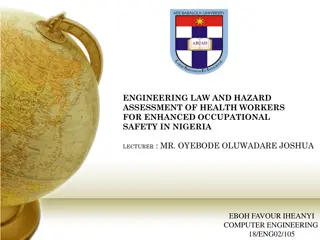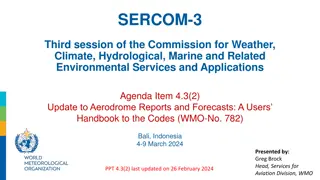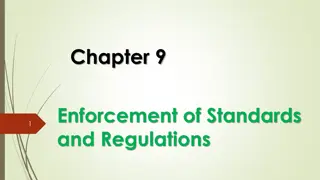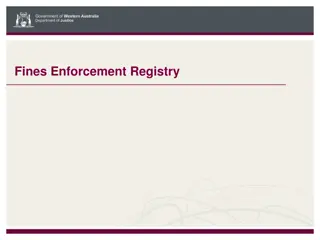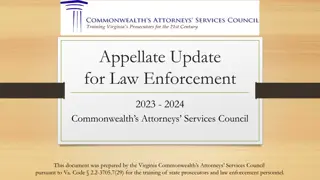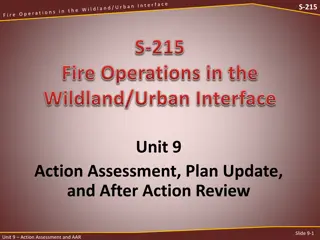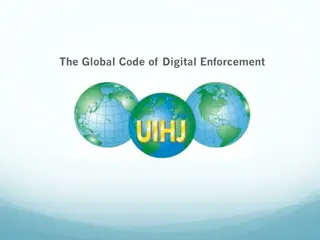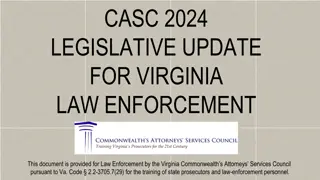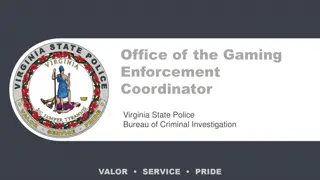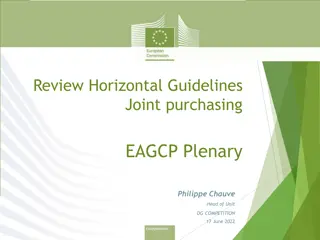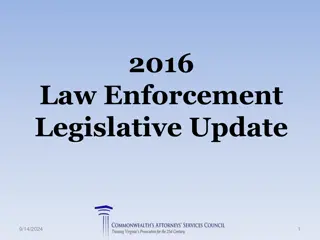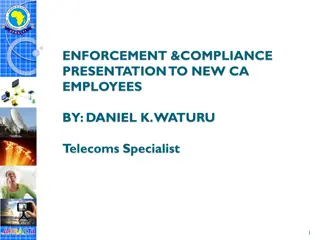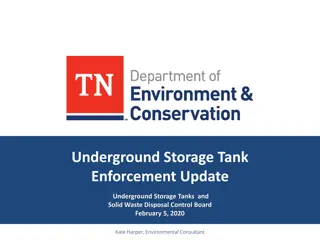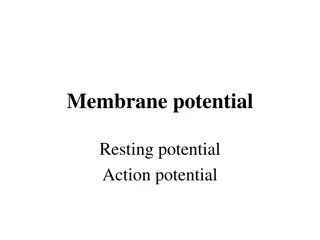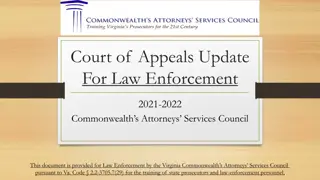
Financial Sector Enforcement Division Overview
"Explore the enforcement process of the FSCA's Enforcement Division, focusing on fair investigations, administrative sanctions, and credible deterrence against misconduct in the financial sector. Learn about case selection, investigation powers, and the approach to sanctions, ensuring visibility and integrity. Find out how final decisions are made, published sanctions, and the reconsideration process. Enhance your understanding of regulatory strategy and the pursuit of good outcomes for customers within the financial industry."
Download Presentation

Please find below an Image/Link to download the presentation.
The content on the website is provided AS IS for your information and personal use only. It may not be sold, licensed, or shared on other websites without obtaining consent from the author. If you encounter any issues during the download, it is possible that the publisher has removed the file from their server.
You are allowed to download the files provided on this website for personal or commercial use, subject to the condition that they are used lawfully. All files are the property of their respective owners.
The content on the website is provided AS IS for your information and personal use only. It may not be sold, licensed, or shared on other websites without obtaining consent from the author.
E N D
Presentation Transcript
INTRODUCTION The Enforcement Division (Division) was created on 1 April 2018 when the FSCA came into existence. It is a combination of the previous Inspectorate and Director of Market Abuse Departments. The Division consists of 3 departments: the Enforcement Department, the Market Abuse Department, and Specialist Litigation Support Department. The Division is focused on contributing to the FSCA s Regulatory Strategy (Dec 2021 to March 2025) and the strategic objective to act against misconduct to support confidence and integrity in the financial sector . The Regulatory Strategy emphasizes the need to act decisively and visibly against misconduct, and to take visible, meaningful action. An overriding consideration is good outcomes for customers. In short, we pursue credible deterrence through visible enforcement
THE INVESTIGATION PROCESS The FSCA s enforcement process is designed to be fair and consistent, and for administrative sanctions to be meaningful, but appropriate. All administrative sanctions imposed by the FSCA are subject to PAJA but not all FSCA actions are administrative actions. The enforcement process commences with the receipt of a complaint, tip-off, or information from the public, the industry, the other FSCA Divisions, foreign and domestic regulators, or other agencies. This is routed to the Division s Assessments team where a desktop investigation is completed, and the information is considered for issues like jurisdiction, merits, and our enforcement case selection policy. Given that we receive many more complaints that we have capacity to investigate, we have a case selection policy to assist us in deciding on cases to be (fully) investigated. Factors that are taken into account includes the quantum of losses, the extent of the case, impact for a larger group of clients, the media profile of the case and the age of the case or the information.
THE INVESTIGATION PROCESS Before a full investigation is undertaken, the FSCA must have a reasonable suspicion that a financial sector law has been contravened. Only then is the FSCA permitted to utilise its investigation powers under sections 136 to 139 of the FSR Act (interviews under oath, notice to produce documents, search and seizure powers etc). Our investigation powers are limited to possible contraventions of financial sector laws. Search and seizure warrants must be applied for (ex parte), to a judge or magistrate in the jurisdictional area of the intended search. Search and seizure operations has moved away from collecting boxes of paper evidence to mirror- imaging of servers, personal computers and hand-held devices. The interrogation of the evidence on these devices are being aided by applications that facilitate finding the relevant information.
APPROACH TO ADMINISTRATIVE SANCTIONS Following an investigation, the FSCA has several enforcement sanctions available to it. The approach of the Enforcement Division to sanctions are informed by the FSCA strategy and mandate. (visible enforcement credible deterrence) In compliance with PAJA, respondents are provided with the opportunity to comment on the intended findings and sanctions of the FSCA. Once this is received a final decision is made on sanctions. Enforcement actions taken by the FSCA are published on its website and made known through media releases to increase awareness of misconduct and to augment visible enforcement. Sanction decisions may be taken on reconsideration to the Financial Sector Tribunal, an independent body chaired by a retired judge.
ADMINISTRATIVE PENALTIES Section 167 of the FSR Act provides for the FSCA to impose administrative penalties if a person has contravened a financial sector law. The section deals with several factors to be taken into account but the focus of the FSCA decisions is on disgorgement of unlawful gains (where practical). Another important aggravating factor is the prejudice suffered by clients or members of the public. We therefore are therefore obliged to consider the causal link between the contravention and the losses. Cooperation with the FSCA investigation is a material mitigating factor, and making good losses suffered by clients will result in a substantial discount of an intended penalty. Penalties are collected through civil execution process and a penalty may not be imposed if a criminal prosecution has commenced.
DEBARMENTS The FSCA may debar a natural person if such person has contravened a financial sector law, an enforceable undertaking, a foreign financial law or attempted, or if such person conspired with, aided, abetted, induced, incited or procured another person to contravene a financial sector law. A debarment prohibits the person, for a specified period, from - providing, or being involved in the provision of, specified financial products or financial services, generally or in circumstances specified in the order; acting as a key person of a financial institution; or providing specified services to a financial institution, whether under outsourcing arrangements or otherwise The primary consideration is to protect consumers. Most debarments (more than 170 to date in this financial year) occur because of dishonesty or lack of oversight by key individuals
OTHER REMEDIES AND SANCTIONS Revocation of licence The FSCA may withdraw authorisations, inter alia, if a licence condition has been contravened, the licensee has materially contravened a financial sector law, failed to comply with a directive, or defaulted on an enforceable undertaking. The primary consideration is to protect consumers against risk and financial harm to the public. Directives The FSCA may issue a directive to a financial institution to take specified action under certain circumstances. Statutory managers and curatorships The FSCA may apply to the High Court, on an ex parte basis, for the appointment of a curator to take control of, and to manage the whole or any part of, the business of an institution, or it can appoint a statutory manager by agreement with the institution concerned.
ENFORCEABLE UNDERTAKINGS The FSCA may enter into an enforceable undertaking with any person. The investigated person undertakes to implement specific remedial action which may include customer redress. Enforceable undertakings improve enforcement efficiency, especially where the outcome of a matter is predictable or a high level of cooperation is present, by obviating the need to impose formal regulatory or enforcement actions. The Enforcement Division utilises this remedy to bring about regularisation of unregistered business if the circumstances merit such a cause of action. [Example: Unregistered ODP business with full risk management hedging and incorrect interpretation of the law.]
COOPERATION WITH THE CRIMINAL AUTHORITIES The FSCA is not responsible or mandated to conduct criminal- investigations and prosecutions. The FSCA has no control over either of these functions; that is the exclusive domain of the South African Police Services and the National Prosecution Services. However, The FSCA cooperates with criminal authorities in FSCA cases that are actively handed over to them and provide assistance in any case where we are requested to do so. The FSCA also provide training and workshops to the law enforcement agencies, including the Commercial Crime Units, the Commercial Crime Courts and the Asset Forfeiture Units. We have several liaison projects with the SAPS and NPA to leverage off our respective mandates. We have conducted joint investigations successfully in the past and plan to formalise the process.
COOPERATION WITH THE CRIMINAL AUTHORITIES At the commencement of an investigation the FSCA considers assets under threat. If present we cooperate with the FIC and the AFU to safeguard such assets. FSCA INVESTIGATION FIC FREEZING OF ACCOUNT AFU APPLICATION AFU CURATOR PRESERVATION ORDER FORFEITURE ORDER FSCA CURATOR OTHER
COOPERATION WITH THE CRIMINAL AUTHORITIES [EXAMPLE] The Investigated party offered clients the opportunity to invest funds with him that he would then invest in offshore shares (Tesla, Apple).These funds were paid into two bank accounts. We approached the AFU and FIC simultaneously to have the funds frozen and preserved. We also conducted a search and seizure operation but ensured that the freezing of the bank accounts and the execution of the warrant happened simultaneously, to ensure that the one action does not alert the investigated party to the other action. Thereafter more accounts were discovered and frozen. The public was made aware of this through two public warnings. In total an amount of R 15 Million was preserved which is to be distributed amongst the victims through the appointment of a curator bonis by the AFU. .
COOPERATION WITH THE CRIMINAL AUTHORITIES MTI has been named the biggest Ponzi crypto scheme to date. MTI received Bitcoin from members of the public into cryptocurrency wallets for the purpose of MTI trading on their behalf initially in derivatives based on forex pairs and later in crypto derivatives. MTI claimed to have an artificial intelligence bot trading for them which made exceptional returns of 10% per day and had never closed out in a loss position other than on 1 trading day. The bot did not exist, and the claimed returns were false. MTI also claimed that the funds were all deposited with an unregulated broker named Trade 300 which we discovered did not exist and was created by Steynberg. Total recovered for the period April 2019 to December 2020 was approximately 1280 Bitcoin worth more than R1.1 billion at the time. MTI manipulated the trading results of a demo account and presented them as live trading results. Only a very small percentage of the funds was actually utilised for trading in derivatives.
COOPERATION WITH THE CRIMINAL AUTHORITIES As part of our enforcement efforts, we are assisting the Directorate for Priority Crime Investigations (DPCI / Hawks), the South African Revenue Services (SARS) and several foreign regulators, including USA and Canada. Our assistance to the Hawks extends to their efforts to extradite Mr Steynberg from Brazil and to pursue criminal sanctions in South Africa. Similar information has been provided to SARS and the FBI for their respective investigations. This is the new face of investigations:- no money to follow through banks accounts and the bulk of the evidence is outside the Republic.
LEGAL CHALLENGES The Investigation activities of the FSCA have not gone unchallenged. There are currently two applications pending in the High Court where the applicants seek declaratory and review relief relating to the validity and constitutionality of two FSCA search warrants. Our jurisdiction to impose sanctions on persons resident outside of SA has also been (successfully) challenged in the Viceroy matter. The FSCA has taken the matter on review to the High Court and the matter is pending.
LEGAL CHALLENGES During 2018 Viceroy Research Group published a document wherein they made material adverse statements regarding Capitec Bank Holdings Limited ( Capitec ), a company listed on the Johannesburg Stock Exchange. Viceroy Research deliberately publicized the statements widely in South Africa and on the day of publication the share price of Capitec decreased by more than 20%. Viceroy profited from the fall in the Capitec share price through an agreement that it had with a hedge fund based in the Cayman Islands. Viceroy Research is a partnership established in terms of the laws of New York and has one British and two Australian citizens as partners.. The FSCA found that Viceroy had contravened Section 81 of the Financial Markets Act 19 of 2012 ( the FM Act ) in that they had published false, misleading or deceptive statements and imposed an administrative penalty of R50 million.
LEGAL CHALLENGES Viceroy applied to the Financial Sector Tribunal for reconsideration of the FSCA s decision to impose the administrative penalty. A majority of the Tribunal upheld the application for reconsideration and set aside the FSCA order on the basis that the FSCA had jurisdiction over the conduct in this instance, but the majority of the Tribunal held that the FSCA did not have jurisdiction over the person of the Viceroy partners, being foreign peregrini. The case relates to administrative penalties, not debarments or withdrawals.
RECENT CASE: PSSPF The PSSPF (Private Security Sector Provident Fund) is a pension fund organisation registered in terms of the Pension Funds Act, 1956. Based on an on-site inspection and a full investigation into the affairs of the PSSPF, the following findings were made: The board of the PSSPF deviated from its own procurement policy and processes in the appointment of service providers, without any justifiable basis; Agreements in respect of the appointment of service providers were inconsistent with service providers tender proposals; Tender negotiations with service providers took place after conclusion of the tender process, in violation of applicable regulations; The rates paid to board members were higher and inconsistent with the PSSPF s Trustee Remuneration Policy; and Board members attended a Golf Day and the Batseta Conference and were remunerated for attending the events.
RECENT CASE: PSSPF .The FSCA concluded that the board members failed to take all reasonable steps to ensure that the interests of members, in terms of section 7C of the Pension Funds Act, were always protected; failed in their fiduciary duty of acting with due care, diligence and good faith, by failing to ensure that the procurement of service providers was done in a cost- effective manner; and failed to ensure that the resources of the PSSPF were utilised in a sound and cost-effective manner, which constituted a breach of the board s duties in terms of the PFA and the Financial Institutions (Protection of Funds) Act, 2001; the Principal Officer was no longer fit and proper to hold office as contemplated in section 8(5)(a) and (c) of the PFA .
RECENT CASE: PSSPF .The FSCA: appointed statutory managers to the board of management of the PSSPF in terms of section 5A(1) of the Financial Institutions (Protection of Funds) Act; imposed administrative penalties on five trustees and the Principal Officer totaling R622 300; removed five trustees from their positions ito section 26(4) of the Pension Funds Act; determined that the Principal Officer was no longer fit and proper to hold office as contemplated in section 8(5)(a) and (c) of the Pension Funds Act;
SOCIAL MEDIA MONITORING .The FSCA has engaged an external service provider to monitor social media for indicators of scams, including FSP names and numbers being utilised fraudulently, promises of unrealistic returns, and claims about being licenced by the FSCA. Since inception (approximately 9 months) we have received 221 hits relating to insurance, investments, loans, Ponzi schemes, business funding, WhatsApp scams, crypto trading, impersonating an FSP etc. The majority of the hits are not relevant to the FSCA, but .
Gerhard van Deventer Gerhard.vandeventer@fsca.co.za 083 461 0570



